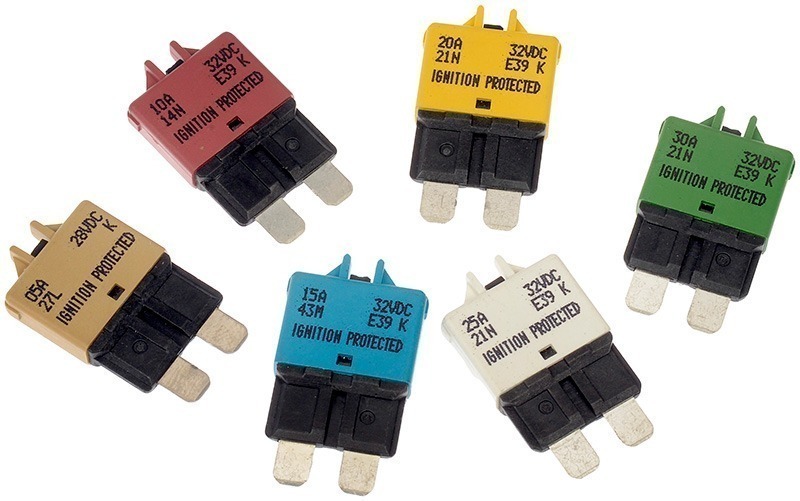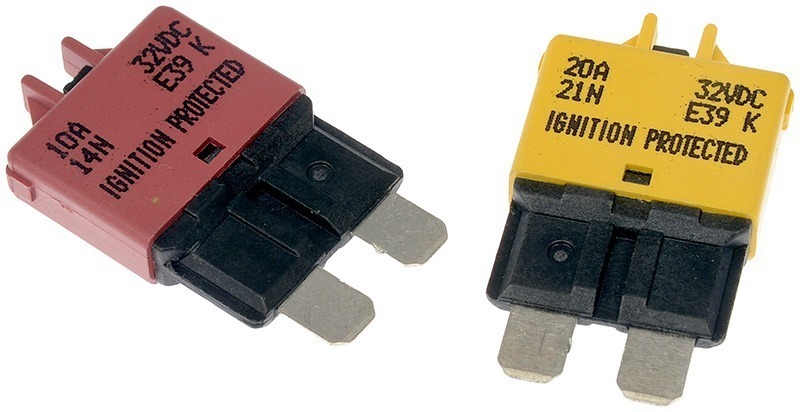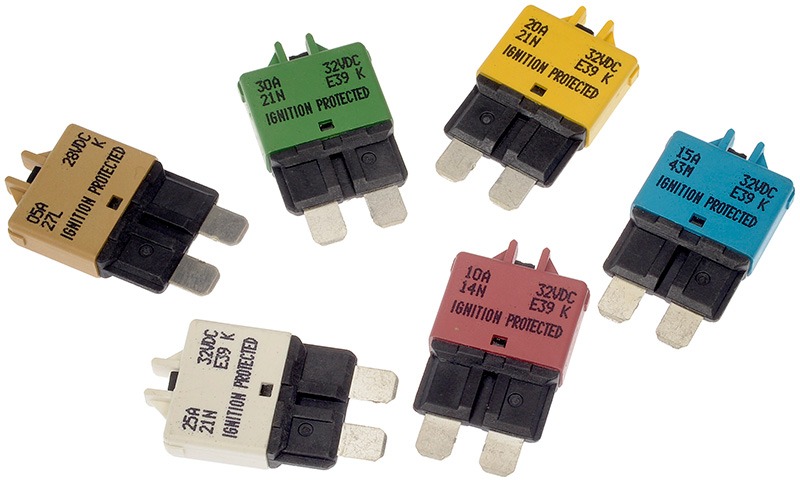Don’t leave alternative vehicles on the sidelines.

My brother and I both work in vehicle repair, and he sure got my attention when he gave me a set of resettable blade “fuses” to try out. These devices are actually fuse-shaped circuit breakers, and my new kit of six breakers goes up to 30A in 5A increments—just right for most auto circuits. For professional vehicle repair, circuit breakers are not a long-term solution for a circuit that keeps tripping. The root cause of that issue must be found and addressed before the vehicle leaves your bay. So how else might a pro use these?
After messing around with these breakers for a little while, I’m glad to have them, but I’m also not swapping out all the fuses in my car to run breakers only.

Photo: Mike Apice.
Before getting into my favorite use cases for these, let’s take a minute to examine the differences between fuses and circuit breakers. A traditional fuse has a fuse element that permanently burns out to disconnect a circuit when amperage exceeds the fuse’s rated limit. That fuse cannot be reused, and a new one must be installed to restore circuit operation. In contrast, these micro breakers trip just like the breakers that are (almost certainly) in your home’s electrical panel. When the rated amperage is exceeded, the circuit is disconnected, but it can be reconnected by simply using the breaker’s reset to get that circuit back in business.
Although self-resetting breakers in blade-fuse-sized formats have been around for a while, I’ve never liked the automatic reset feature. A blown fuse or tripped breaker means there is a problem, and I would rather have manual control over any resets so that the circuit remains off until I’m ready. That’s why I’m recommending the newer manual reset style over the older “automatics” here.
Fuse size is another caveat here. At the time of writing, resettable breakers are only available for standard, maxi, mini, and low profile mini ATM blade formats. These sizes are ideal for many older vehicles, but I haven’t seen any circuit breakers sized for micro fuses or any of the other bitty fuse types found in today’s cars and trucks. That’s probably due to physical limitations for the circuit breaker mechanism. So if you mostly work on relatively new cars, don’t count on these gizmos to be much help.
Cost is a major difference between fuses and circuit breakers to consider. Blade or mini-blade fuses are pennies apiece. In contrast, a set of six blade circuit breakers will run you about $25, and that’s fairly consistent across different sizes and manufacturers. You could buy hundreds of blade fuses for that kind of money—and it’s always good to have plenty on hand. But I’ve come to the conclusion that these “circuit bladers” are the ultimate spare fuses. Here are three situations where they’d really come in handy.

Photo: Mike Apice.
Do you have a “road box” of tools for repairs in the field? Throw a set of these little resettable units in your kit. Compared to the toolbox and bay you probably have back at the shop, your selection of tools for mobile work will be extremely limited. Anything you bring to a stranded customer vehicle should have a critical role to play in routine troubleshooting, and if that tool can serve multiple functions, that’s even better. Resettable fuses are smaller and cheaper than a DVOM, and they don’t have any batteries to go flat just when you need them. At a minimum, pick up a 10A and 20A for the road box.
Campers, hunters, van lifers, delivery drivers, Wyoming residents, and other adventuresome folk driving off the beaten path should absolutely toss a few of these breakers in their glove boxes before visiting desolate locations. Two is one, one is none, right? And one that can be reused over and over again could be very nice to have out in the bush.
Sure, most vehicles are equipped with a few spare fuses in their fuse boxes. Customers with a little DIY experience should be able to handle swapping in those spare fuses to limp their vehicles home when electrical trouble strikes. And if the fuse blows again, more spares can be found easily enough… unless customers like those mentioned above are traveling in sparsely populated areas where there are no towns, passing motorists or auto parts stores around to supply spares.

Photo: Mike Apice.
Big amps, big speakers, big wattage… You know exactly who these customers are. And popping fuses is a rite of passage, if not a way of life, for a lot of car audio enthusiasts, especially if they dabble in the DIY side of things. Circuit breakers might be a smart upgrade to keep these customers from getting frustrated while setting up or changing their audio systems.
If any of these use cases sound ideal for your or your customers, give these little circuit breakers a try. I’ve already stashed a few in my road box for the next time I work on a stranded vehicle with electrical gremlins. Just don’t forget to get your circuit breakers back from the fuse box after resolving the issue.
The articles and other content contained on this site may contain links to third party websites. By clicking them, you consent to Dorman’s Website Use Agreement.
Participation in this forum is subject to Dorman’s Website Terms & Conditions. Please read our Comment Policy before commenting.